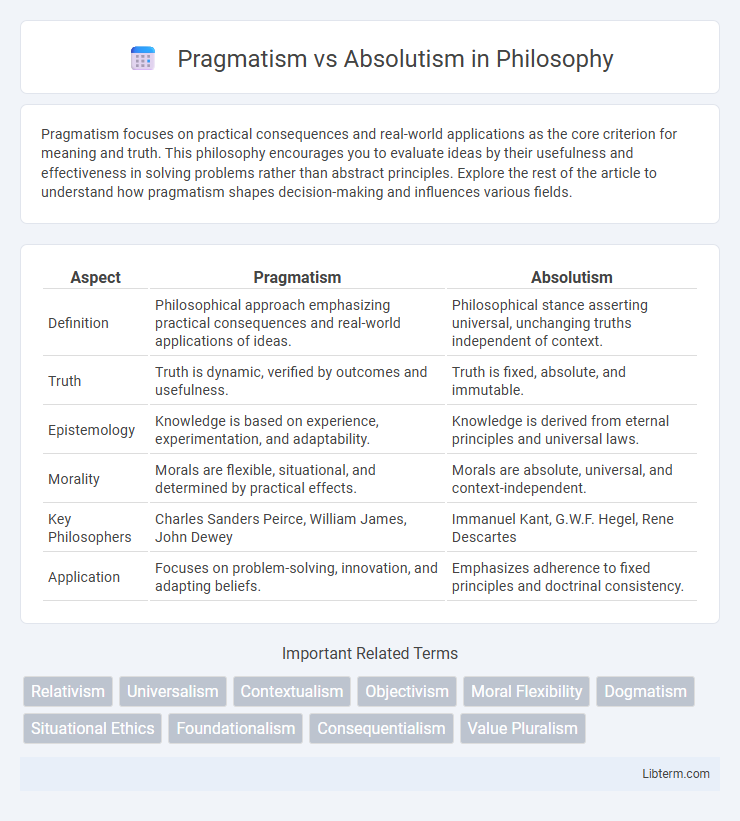Pragmatism focuses on practical consequences and real-world applications as the core criterion for meaning and truth. This philosophy encourages you to evaluate ideas by their usefulness and effectiveness in solving problems rather than abstract principles. Explore the rest of the article to understand how pragmatism shapes decision-making and influences various fields.
Table of Comparison
| Aspect | Pragmatism | Absolutism |
|---|---|---|
| Definition | Philosophical approach emphasizing practical consequences and real-world applications of ideas. | Philosophical stance asserting universal, unchanging truths independent of context. |
| Truth | Truth is dynamic, verified by outcomes and usefulness. | Truth is fixed, absolute, and immutable. |
| Epistemology | Knowledge is based on experience, experimentation, and adaptability. | Knowledge is derived from eternal principles and universal laws. |
| Morality | Morals are flexible, situational, and determined by practical effects. | Morals are absolute, universal, and context-independent. |
| Key Philosophers | Charles Sanders Peirce, William James, John Dewey | Immanuel Kant, G.W.F. Hegel, Rene Descartes |
| Application | Focuses on problem-solving, innovation, and adapting beliefs. | Emphasizes adherence to fixed principles and doctrinal consistency. |
Introduction to Pragmatism and Absolutism
Pragmatism emphasizes practical consequences and real-world applications as the basis for meaning and truth, prioritizing adaptability and outcomes over fixed principles. Absolutism holds that certain moral rules and truths are universal, unchanging, and independent of individual beliefs or contexts. The tension between pragmatism and absolutism reflects a core philosophical debate about whether truth is situational or absolute.
Historical Background and Philosophical Origins
Pragmatism emerged in the late 19th century United States, pioneered by philosophers such as Charles Sanders Peirce, William James, and John Dewey, emphasizing practical consequences and experiential verification as the basis of meaning and truth. Absolutism, rooted in classical philosophy and notably developed during the Enlightenment, asserts that certain principles or truths are universal, unchanging, and independent of human experience, with key contributions from thinkers like Immanuel Kant and Rene Descartes. The historical tension between pragmatism and absolutism reflects divergent views on the nature of truth, knowledge, and reality, where pragmatism prioritizes adaptability and context, while absolutism defends stability and objectivity.
Core Principles of Pragmatism
Pragmatism centers on the principle that truth is determined by practical outcomes and usefulness rather than fixed, absolute standards. It emphasizes flexibility, adaptability, and the continuous testing of ideas through experience and experimentation. Core tenets include the belief that knowledge evolves with context and that reality is best understood by its effects on human action.
Key Tenets of Absolutism
Absolutism centers on the belief in absolute, unchallengeable authority usually vested in a single ruler or governing body, emphasizing the centralization of power. It maintains that laws and moral principles are fixed, universal, and not subject to individual interpretation or situational flexibility. This doctrine supports the idea that truth and justice are objective and immutable, contrasting sharply with the adaptable, consequence-based approach of pragmatism.
Pragmatism in Everyday Decision-Making
Pragmatism in everyday decision-making emphasizes practical outcomes and flexibility over fixed principles, allowing individuals to adapt solutions based on context and consequences. This approach prioritizes real-world effectiveness, often leading to more efficient resolution of problems compared to Absolutism's rigid adherence to unchanging rules. Pragmatic choices reflect a continuous reassessment of goals, balancing immediate needs with long-term benefits to optimize everyday life experiences.
Absolutism and Moral Certainty
Absolutism asserts that moral principles are fixed, universal, and unchanging, providing clear guidelines for distinguishing right from wrong regardless of context. This perspective emphasizes moral certainty, where ethical decisions are based on objective truths rather than subjective interpretations or situational factors. In contrast to pragmatism's flexible approach, absolutism upholds unwavering standards that are often derived from religious, philosophical, or cultural doctrines.
Comparative Analysis: Strengths and Weaknesses
Pragmatism excels in adaptability and practical problem-solving by prioritizing outcomes and real-world effectiveness, but it can lack consistency and clear moral guidelines. Absolutism offers a stable ethical framework with universal principles, ensuring clear decision-making, yet its rigidity may lead to inflexibility and challenges in addressing complex or evolving situations. Comparing both approaches highlights pragmatism's strength in flexibility and contextual judgment versus absolutism's strength in providing definitive rules, with weaknesses centering on pragmatism's potential for relativism and absolutism's potential for dogmatism.
Pragmatism vs Absolutism in Ethics
Pragmatism in ethics emphasizes flexibility and evaluates moral actions based on their practical consequences and context-specific outcomes, contrasting with Absolutism which holds that moral principles are fixed, universal, and apply consistently across all situations. Pragmatists argue that ethical decisions must adapt to changing circumstances, promoting problem-solving and experiential learning, whereas Absolutists maintain that certain ethical rules, like honesty and justice, are immutable regardless of context. This fundamental difference shapes how moral dilemmas are addressed, with Pragmatism favoring situational ethics and Absolutism upholding unchanging moral laws.
Real-World Applications and Case Studies
Pragmatism emphasizes flexible decision-making based on outcomes, often applied in organizational management where adaptive strategies respond to shifting market conditions. Absolutism insists on fixed principles regardless of context, evident in legal systems enforcing constitutional laws without exception. Case studies in healthcare illustrate pragmatic policies adjusting protocols during crises, contrasting with absolutist approaches maintaining strict ethical standards irrespective of situational demands.
Conclusion: Finding Balance Between Approaches
Balancing pragmatism and absolutism requires recognizing the value of practical flexibility alongside steadfast principles. Embracing situational adaptability ensures effective decision-making without compromising core ethical standards. This harmonious approach fosters nuanced solutions that address both immediate needs and long-term ideals.
Pragmatism Infographic

 libterm.com
libterm.com